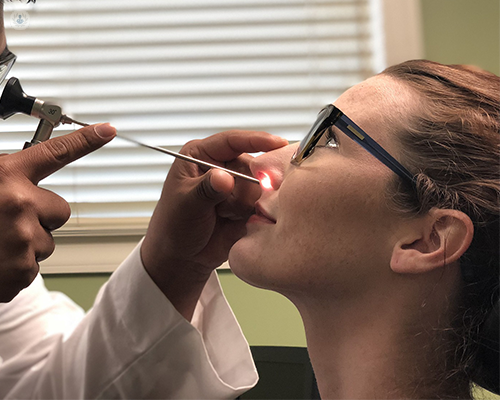When sinusitis becomes serious and what to do about it
Written by:Sinusitis has the potential to wreak havoc on many aspects of everyday life. This condition is characterised by inflammation of your sinuses and can result in symptoms such as facial pain, blocked nose and nasal discharge. Mr Jonathan Hughes, a leading London ENT specialist, is on hand to provide you with all the necessary information regarding sinusitis.

What is sinusitis?
When you see a medical word containing “-itis”, it refers to inflammation somewhere in the body. Sinusitis, therefore, is the inflammation of the sinuses.
Healthy sinuses are air-filled pockets in the skull. There are four pairs of sinuses that help to warm and moisten inhaled air as it moves to the lungs:
- The maxillary sinuses (below the eyes in the cheek area)
- The ethmoid sinuses (between the eyes)
- The frontal sinuses (behind your forehead)
- The sphenoid sinuses (in the centre of the head)
In the diseased state, the sinuses become filled with infected fluid and inflammatory tissue. When we talk about sinusitis, we often refer to it in combination with inflammation in the nose (rhinosinusitis). Sinusitis is considered chronic after twelve weeks of symptoms; anything less than twelve weeks is considered acute.
How is it caused?
The most common cause of sinusitis is infection, often after a cold or upper respiratory tract infection. Sinusitis can also be caused by irritants or an allergy.
When does it become serious? Should I see a specialist?
Potentially life-threatening complications can follow acute sinusitis. If you have the following problems, you should go to A&E straight away to be assessed.
- Eye swelling
- Symptoms that impact your vision
- Strong headaches
- Swelling of the forehead
These can be concerning signs that the infections is spreading beyond the sinuses; and if left unattended, may result in serious complications. The sinuses are very close to eye sockets and the brain, and sometimes, an infection can spread to the eye sockets, the brain’s venous system (the network of veins around your brain) or the brain itself. Thankfully, serious complications from sinusitis are rare.
Chronic sinusitis often involves less severe symptoms and results in a visit to the clinic, not the emergency department. However, these symptoms can still have a very negative impact on a person’s quality of life. The side-effects of significant chronic sinusitis are:
- The nose feels blocked all the time
- It feels difficult to breath
- Unpleasant smells or no sense of smell
- Postnasal drip
- Facial pain
How is chronic sinusitis diagnosed?
When a patient comes to see an ENT specialist and is suspected of having chronic sinusitis, they’ll first have a thorough history of the patient’s health taken, checking for:
- Nasal symptoms
- Ear symptoms (inflammation of the nose can affect ear pressure)
- Allergy symptoms, such as sneezing and itchiness of the nose and eyes
- Asthma
- Nasal polyps or having previously had surgery for nasal polyps
- Past use of aspirin (people who have taken aspirin in the past and experienced sensitivity may find that it can be a risk factor for severe nasal polyps).
- Previous nasal treatments and/or operations
- Other medical problems
Then a physical examination is performed. The nose and sinuses will be looked at via an endoscopy. An endoscope is a narrow tube with a light and camera, that is used to find any structural problems within the nose and sinuses. It can also allow an ENT specialist to see if pus is emerging from the sinus openings.
If further investigation is needed, a CT scan is often requested. If there is a suggestion of allergy, a skin-prick or blood allergy test can be undertaken.
How is sinusitis treated?
There are different ways of treating chronic sinusitis and a specialist can recommend the right one for you. Generally, nasal steroids are the first treatment offered. Saline treatments like nasal washes and rinses are also frequently recommended. If a patient is found to have allergies, allergen avoidance strategies and anti-histamine medication may be of benefit.
If the first course of treatment doesn’t provide much improvement, more aggressive forms of steroids can be considered. These may be provided in the form of nasal drops or short courses of steroid tablets. A long-term course of antibiotics may also be tried.
If the symptoms are still ongoing after having tried more aggressive medical treatments, then surgical treatments are the next option. These range from less invasive procedures, such as balloon dilatation surgery, in which a balloon is inflated to open up the sinus openings and allows them to drain effectively, to more traditional endoscopic surgery which involves removing parts of the sinus. The sinuses are similar to a honeycomb structure and small partitions can safely be removed to allow better drainage.
Other issues may also need to be addressed to treat sinusitis, such as straightening up the nasal septum or reducing the size of the inferior nasal turbinates.
Mr Jonathan Hughes is an expert in a full range of general and paediatric ear, nose and throat conditions. Click here to see his profile and learn how he can help you.


